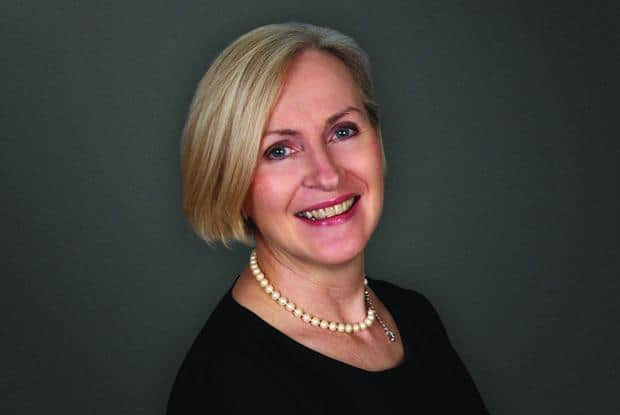Legal review: Reflections on a tumultuous 2022
One of the biggest issues faced by firms across the legal landscape over the last 12 months is what some are calling a “war for talent”, which shows no signs of easing. Senior lawyers say attracting and retaining talent is becoming increasingly difficult.
The situation means that law firms are having to try to quickly adapt to respond to the changing needs and demands of employees, for example, in continuing to offer remote and hybrid working.
Advertisement
Hide AdAdvertisement
Hide AdAllan Wernham, managing director (Scotland) at CMS, says: “The last year saw us transition from a situation where almost most of our colleagues worked remotely to a hybrid working model. Being back in the office, being able to be with people face to face, creates a big opportunity for businesses generally but also for the legal sector. While we have embraced hybrid working, we appreciate the level of engagement needed to build new working relationships and help clients deliver on their priorities is difficult to replicate from our home offices.”


He adds: “We are currently seeing a war for talent. This has been further complicated by the ability to work from home, and higher priced markets like London casting their nets more widely. It requires firms like ours, with a large presence locally in Scotland, to really focus on getting a message across to candidates that’s not just about salary and conditions, but also about our culture, and the quality of work and wider opportunities we can offer.”
Claire Armstrong, managing partner at Dentons in Scotland, shares similar concerns over recruitment, saying: “Currently, the main challenge is the vast amount of work there is in the marketplace, while all professional services companies are juggling the attainment and retention of talent. Training and maintaining our people is a top priority in the era of the ‘Great Resignation’. Offering a hybrid way of working, greater flexibility and work/life balance is increasingly important to everyone.”
Peter Lawson, chairman of Burness Paull, identifies the biggest challenge of the last year as striking the right balance around the return to the office. “People understandably want to retain flexibility, but we also recognise the clear benefits that being in the office with regards to team cohesion, culture, wellbeing and career development.”
Lawson adds that as well as the widespread adoption of hybrid and more flexible working, a welcome change that the pandemic brought is the increased focus on colleague wellbeing and mental health.


He says: “We were already committed to making changes, but the onset of Covid meant an acceleration of that agenda. This included the appointment in 2021 of our first dedicated inclusion and wellbeing manager, which we believe was a first in the Scottish legal industry.”
Nick Scott, managing partner at Brodies, has also been managing the concept of hybrid working and how it influences the finding and keeping of good people.
He says: “As we move into a world of hybrid, or smart working as we call it, one of the biggest priorities for all businesses has been to understand what pattern of working works best for them.
Advertisement
Hide AdAdvertisement
Hide Ad“We have worked hard to ensure we strike the right balance between the new-found flexibility, with productivity and team cohesion, camaraderie and ‘togetherness’. Getting that right – or wrong – will have very significant impacts on staff motivation and retention, as well as recruitment, and in a people business that is critical.”
Andrew Chalmers, managing partner of Davidson Chalmers Stewart, agrees that the biggest issue in the Scottish legal sector is “undoubtedly” recruitment, saying: “Firms are really having to up their game and ensure they provide their people with a great working environment if they want to continue to attract the best talent.”
Murray McCall, managing partner at Anderson Strathern, also pinpoints recruitment as being top of the agenda and says his firm has certainly not been immune: “Encouragingly, however, for every colleague who departs, we have been able to recruit two, so we are less affected than other organisations. We have adopted a ‘super-agile’ way of working, built on trust, which seems to strike a chord. When all else is equal, how you treat people speaks volumes.”
Martin Darroch, chief executive of Harper Macleod, says: “The challenges for us have been no different to our clients and the rest of society – managing the impact of the pandemic, Brexit ramifications, economic uncertainty on both an international and local level, and the ongoing contest to recruit and retain talent.
“Overcoming the situations arising from the pandemic has required a new way of working, but also a focus on relationships.”
Turning to sustainability, more than a year on from the COP26 Climate Summit in Glasgow, environmental, social and governance (ESG) issues are still a priority for the legal profession. In September, the Law Society of Scotland announced it was stepping up its efforts to lead and support the sector in tackling the climate crisis by launching a new Sustainability Committee.
But a question mark remains over what COP26 has delivered in reality. Armstrong says: “COP26 has sharpened people’s minds. More organisations have invested in the development of authentic ESG policies and created change in the way companies operate, for example, when considering the environmental grading of office premises and travel.”
According to Darroch, it is difficult to see the immediate impact of COP26, not just on the legal sector, but on society as a whole, given the current discussion around energy: “At the time, the conversation was very much around sustainability. Now look where we find ourselves in a relatively short space of time when, as a society, we are talking about energy security.”
Advertisement
Hide AdAdvertisement
Hide AdLawson says Burness Paull was already on a journey to improve ESG and sustainability before COP26. The firm has since set targets aligned to the UN Global Compact and Sustainable Development Goals, including achieving net-zero by 2030, and the elimination of single-use plastics in its purchasing.
“The ambition to be more sustainable is certainly one that seems to be shared across the sector, which is positive as it requires a collective effort to drive meaningful change,” he says. “Law firms are well-placed to support clients on achieving their sustainability objectives, whether it’s securing planning permission for clean energy projects, supporting finance deals that fund innovation and the energy transition, or advice around ESG.”
Scott believes the question is not so much about COP26 itself, but its urgent call to action: “Policy is now guided as much by energy cost and energy security as transition. All of that is driving a more informed discussion about the energy market and how it operates, and a better understanding that complex situations need complex answers which go beyond ‘oil bad, renewables good’.
“All law firms themselves are committing to net-zero carbon paths, and that is influencing their choice of offices, sourcing of utilities, engagement with their own suppliers, and travel and other policies. And in terms of client work, energy – in all its forms – will be very big sources of legal work for law firms in the years ahead.”
Wernham says: “COP26 brought the focus of the world onto climate change and that legacy remains firmly in place. While short-term pressures and focus has shifted as a result of the war in Ukraine and the prioritisation of energy security, there seems little doubt that the environment, and ESG issues more broadly, remain a priority. Our colleagues across the firm in every discipline are seeing this in action every day, with clients facing investor and regulatory pressures to focus on climate change.”
And McCall points out that this has been a strong year for projects focussed on the green economy, particularly clean energy. He explains that, post-COP26, law firms which had the foresight to recruit lawyers with relevant skills are now seeing a significant uplift in activity. He gives the example of its leasing work for the ScotWind project on behalf of Crown Estate Scotland.
Green matters have been keeping many firms busy, with Shepherd and Wedderburn managing partner Andrew Blain saying that the fast-growing and innovative sectors of technology and clean energy have seen a lot of activity over the last 12 months. Its current clean energy mandates include work in relation to English Round 4, ScotWind, INTOG and Celtic Sea. The past year has also seen his firm invest in its footprint, while aligning with the firm’s ambitions to be net-zero by 2030.
Richard Cockburn, partner and head of energy at Womble Bond Dickinson, says strained energy security and increased prices as a result of the Ukraine conflict have led to a bigger appetite among investors to support proven renewable technologies and to look with increased interest at new solutions such as hydrogen production, storage and supply.
Advertisement
Hide AdAdvertisement
Hide AdSo far, the economic and political turmoil in the UK and more widely, including war in Ukraine, have not appeared to have had a major impact on law firms in Scotland. Many in the sector are reporting continued good levels of business across the board, as well as a lot of activity aroundESG – and uncertainty can also bring opportunities.
Armstrong says: “At Dentons, we have seen a hive of investment activity from private equity and venture capital over the last 12 months, in all sizes and sectors of Scottish business, with food and drink and life sciences being particularly prominent.”
But she adds that the effects of the political and economic uncertainty could be long-lasting. “We have already seen the impact increased interest rates has had on the banking sector and the knock-on delay with deals being halted as they are no longer viable,” she says. “There is a lot of sophisticated refinancing taking place because of increased interest rates and a surprising amount of real estate deals are happening throughout central Scotland with significant foreign investment.”
Lawson says: “The impact of Russia’s invasion of Ukraine on law firms has largely been macroeconomic, with the knock-on effect on energy and food prices contributing to the high inflation we’re seeing currently. This leads to higher costs – not only for energy, but also in the fight for talent.
He concludes: “The success of law firms is driven, to a large extent, by the quality of people they employ. High inflation in what was already a tight labour market means the cost of attracting and retaining the best people inevitably increases.”
Committee gears up on climate change
With the drive to net -zero having to gather pace, the Law Society of Scotland said in September that it is stepping up its efforts to lead and support the legal sector in tackling the climate crisis by launching a new Sustainability Committee.
It explained that the committee will continue and expand on the work of the Law Society’s COP26 and Climate Change Working Group, which was formed in mid-2020.
Law Society of Scotland chief executive Diane McGiffen says: “The climate crisis is one of the greatest challenges we face.
Advertisement
Hide AdAdvertisement
Hide Ad“The Law Society of Scotland and the Scottish legal sector need to prepare to deal with the impacts of the climate crisis and play our part in progressing to net-zero.
“The new Sustainability Committee will help lead the legal sector and shape the society’s work on sustainability, as we try to meet the challenges and opportunities ahead.
“It will be at the forefront of helping the legal sector in Scotland deal with the impacts of climate change while supporting the profession to take climate conscious and socially responsible action.
“Larger firms and in-house teams have already made considerable progress on sustainability.
“We’ll be championing and encouraging those efforts and working with high street practitioners and others to spread action.”
McGiffen concludes: “We want to create a space where we can learn from and develop great ideas while creating advice and support that will make a difference.”